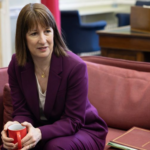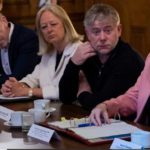Concerns are growing among UK businesses over potential tariff increases following former US President Donald Trump’s announcement of a new trade policy. Trump has instructed his team to develop a system of “reciprocal tariffs,” which would factor in Value Added Tax (VAT) when determining levies on imports. This move could have significant consequences for British exporters.
Under the proposed plan, tariffs on imports to the US would mirror those imposed on American goods abroad. While the UK was previously considered less exposed to tariffs compared to other nations, the inclusion of VAT in the calculations has sparked fresh concerns about the financial impact on British trade.
Analysts predict that UK businesses could face tariffs of 20% or more, bringing them in line with those expected for the European Union. The British Chambers of Commerce (BCC) has warned that industries such as automotive, pharmaceuticals, and food and drink could be particularly vulnerable to the proposed changes.
Trump’s plan, announced by the White House on Thursday, is part of a broader strategy to counter what he calls “unfair or harmful acts, policies, or practices” by trading partners. The former president has long advocated for tariffs as a means to address trade imbalances, though both the UK and US claim to maintain trade surpluses with each other based on different data collection methods.
One of the most contentious aspects of the proposed tariff system is Trump’s characterization of VAT as an “unfair, discriminatory, or extraterritorial tax.” The UK applies a 20% VAT on most goods and services, irrespective of whether they are produced domestically or imported. Some analysts warn that if tariffs are adjusted based on VAT rates, UK exporters could face duties as high as 21%.
George Saravelos, global head of FX research at Deutsche Bank, suggested that European nations would be among the hardest hit by such a system. Meanwhile, William Bain, head of trade policy at the BCC, acknowledged that while the UK exports fewer goods to the US than some other nations, the proposed changes could still create added costs and uncertainty for businesses.
Paul Ashworth, chief UK economist at Capital Economics, argued that VAT is generally considered a neutral tax as it applies equally to all goods sold in the UK. However, one of Trump’s advisers has suggested that VAT disadvantages American businesses, as the US relies on lower state-level sales taxes instead of a national VAT system.
Legal experts caution that the term “reciprocal tariffs” may not mean a direct match of tariffs between nations. Caroline Ramsay, head of international trade at law firm TLT, clarified that the US is likely to determine tariff rates based on its own assessment of fair trade rather than directly mirroring UK tariffs.
As uncertainty looms, business leaders are urging the UK government to engage in negotiations with Trump’s team to avoid the risk of escalating trade tensions. Bain stressed the importance of diplomatic engagement to prevent a damaging cycle of retaliatory tariffs.
Senior UK government minister Pat McFadden called for a measured response, advising businesses to wait and assess whether the proposals materialize before reacting.
With UK-US trade relations in a state of flux, British businesses are preparing for potential cost increases and disruptions to transatlantic commerce. The coming months will be crucial in determining whether these proposed tariffs become a reality and how the UK responds to protect its economic interests.









